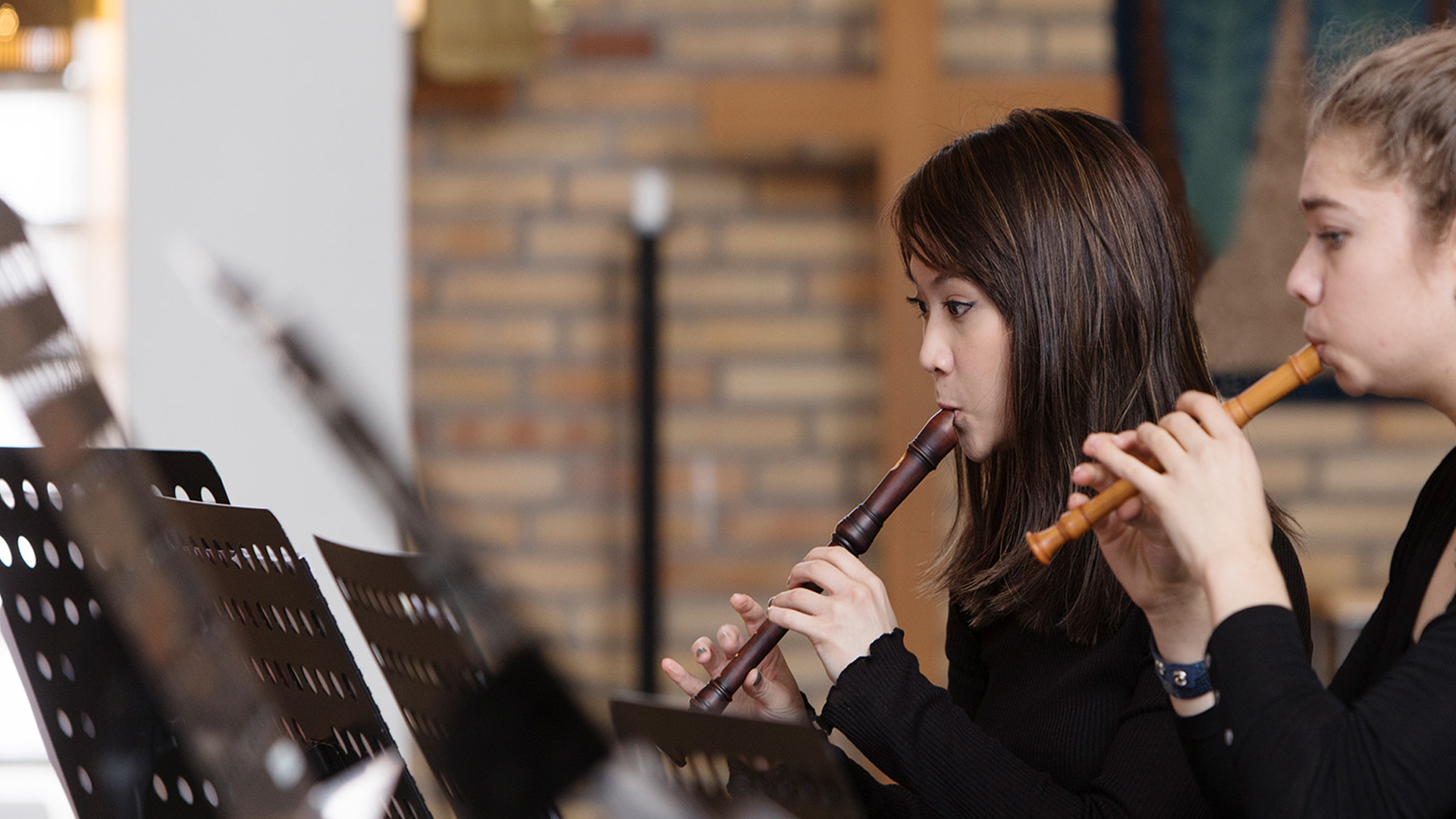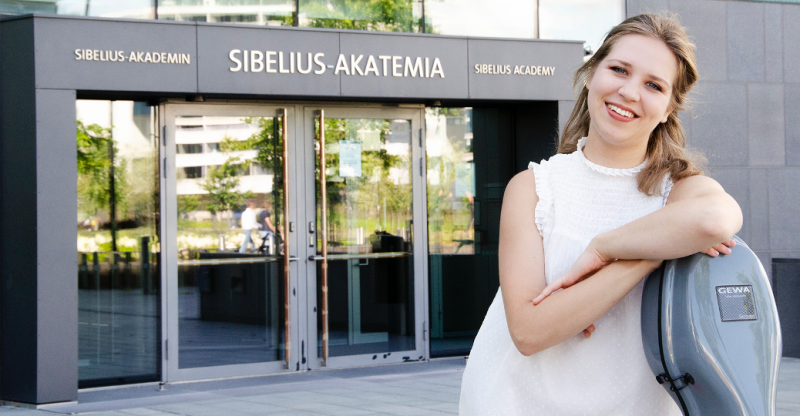Early music, classical instrument, bachelor and master
Immerse yourself in the special characteristics of early music and period instruments with the help of our large instrument collection and excellent training that emphasises ensemble playing.

Why study here?
Come and study at one of the best performing arts universities in the world! As a student of early music, you will increase your knowledge of music from the Renaissance to the romantic era, without forgetting contemporary music composed for period instruments. You will have access to a large collection of instruments, including the full range of baroque orchestra instruments and a collection of renaissance and classical instruments. We believe that ensemble playing is the best way to learn.
Video: Introducing the Department of Early Music
Content and objective of the programme
In the Department of Early Music, your main instrument is one of the following:
- harpsichord
- lute
- viola da gamba
- recorder
- traverso
- baroque violin
- baroque cello
- baroque oboe
- baroque bassoon (master’s studies)
- baroque trumpet (master’s studies)
- natural horn (master’s studies)
You can also study baroque singing and have baroque viola, baroque bassoon, natural horn, baroque trombone, violone, fortepiano or clavichord as a secondary instrument.
In our studies you will become familiar with the performance practices of the different periods and learn how to work in various ensembles and musician roles. Mastery of your own instrument and performing in concerts is at the core of the studies. In addition to the solo repertoire, you will deepen your skills in ensemble playing, for example in our own baroque orchestra and in various chamber music ensembles.
We organise annually chamber music weekends with varied themes in the Kallio-Kuninkala Centre, in cooperation with the Uniarts Helsinki’s Open Campus and Collegium ry.
The studies prepare you for your career by combining artistry and research, seminar work and pedagogical studies. You can also study instrument pedagogy more extensively and complete pedagogical studies to qualify as a teacher. You can also choose courses organised by the other two Uniarts Helsinki academies and complete so-called joint studies that are available to all students.
Bachelor’s studies
During the first three years of studying for the bachelor’s degree, you will not only study your main instrument and ensemble playing, but also musical perception skills, music history and pedagogy. Studying a secondary instrument is also a natural choice for students of early music. Optional studies are also included in the degree.
Master’s studies
During your master’s studies, you will continue studying your main instrument. Optional studies enable you to either develop your competence more broadly or to select a focus area for more in-depth study.
Teachers
Our teachers are some of the best experts in their respective fields. In addition to the permanent teaching staff, the programme welcomes international top experts as guests on a regular basis.
Open University path to studies
You can also apply to the Early music programmes by first completing a minimum of 30 credits of early music path studies at the Uniarts Helsinki Open University. Those applicants will be accepted directly to the second phase of the entrance exams.
Doctoral studies
You can complete a licentiate and a doctoral degree at Uniarts Helsinki as a third-cycle degree. After graduating with a master’s degree, you can apply for doctoral studies in music and specialise in research-oriented, artistic or applied doctoral studies.
Find out more
The Sibelius Academy Baroque Orchestra has established itself as an important part of the Sibelius Academy’s Department of Early Music. The Orchestra has concerts every academic term and engages in cooperation with other training at the Sibelius Academy, for example in the form of opera and oratorio productions.
Student experiences
Target degree and length of study
Master of Music (MMus)
5,5 years
Application period
Next possible time to apply is in January 2025. Studies begin in August 2025.
Application languages
English, Finnish, Swedish
Read more about language skill requirements
Tuition fee
From August 2025, the annual tuition fee is € 12,000 for students who are studying in English and come from outside the EU and EEA countries.
Supervising teacher
-
Annamari Pölhö
Lecturer, harpsichord, Early music, Sibelius Academyannamari.polho@uniarts.fi
Unit
Sibelius Academy
Ask about applying
Why study here?
Come and study at one of the best performing arts universities in the world! As a student of early music, you will increase your knowledge of music from the Renaissance to the romantic era, without forgetting contemporary music composed for period instruments. You will have access to a large collection of instruments, including the full range of baroque orchestra instruments and a collection of renaissance and classical instruments. We believe that ensemble playing is the best way to learn.
Video: Introducing the Department of Early Music
Content and objective of the programme
In the Department of Early Music, your main instrument is one of the following:
- harpsichord
- lute
- viola da gamba
- recorder
- traverso
- baroque violin
- baroque cello
- baroque oboe
- baroque bassoon (master’s studies)
- baroque trumpet (master’s studies)
- natural horn (master’s studies)
You can also study baroque singing and have baroque viola, baroque bassoon, natural horn, baroque trombone, violone, fortepiano or clavichord as a secondary instrument.
In our studies you will become familiar with the performance practices of the different periods and learn how to work in various ensembles and musician roles. Mastery of your own instrument and performing in concerts is at the core of the studies. In addition to the solo repertoire, you will deepen your skills in ensemble playing, for example in our own baroque orchestra and in various chamber music ensembles.
We organise annually chamber music weekends with varied themes in the Kallio-Kuninkala Centre, in cooperation with the Uniarts Helsinki’s Open Campus and Collegium ry.
The studies prepare you for your career by combining artistry and research, seminar work and pedagogical studies. You can also study instrument pedagogy more extensively and complete pedagogical studies to qualify as a teacher. You can also choose courses organised by the other two Uniarts Helsinki academies and complete so-called joint studies that are available to all students.
Bachelor’s studies
During the first three years of studying for the bachelor’s degree, you will not only study your main instrument and ensemble playing, but also musical perception skills, music history and pedagogy. Studying a secondary instrument is also a natural choice for students of early music. Optional studies are also included in the degree.
Master’s studies
During your master’s studies, you will continue studying your main instrument. Optional studies enable you to either develop your competence more broadly or to select a focus area for more in-depth study.
Teachers
Our teachers are some of the best experts in their respective fields. In addition to the permanent teaching staff, the programme welcomes international top experts as guests on a regular basis.
Open University path to studies
You can also apply to the Early music programmes by first completing a minimum of 30 credits of early music path studies at the Uniarts Helsinki Open University. Those applicants will be accepted directly to the second phase of the entrance exams.
Doctoral studies
You can complete a licentiate and a doctoral degree at Uniarts Helsinki as a third-cycle degree. After graduating with a master’s degree, you can apply for doctoral studies in music and specialise in research-oriented, artistic or applied doctoral studies.
Find out more
The Sibelius Academy Baroque Orchestra has established itself as an important part of the Sibelius Academy’s Department of Early Music. The Orchestra has concerts every academic term and engages in cooperation with other training at the Sibelius Academy, for example in the form of opera and oratorio productions.
